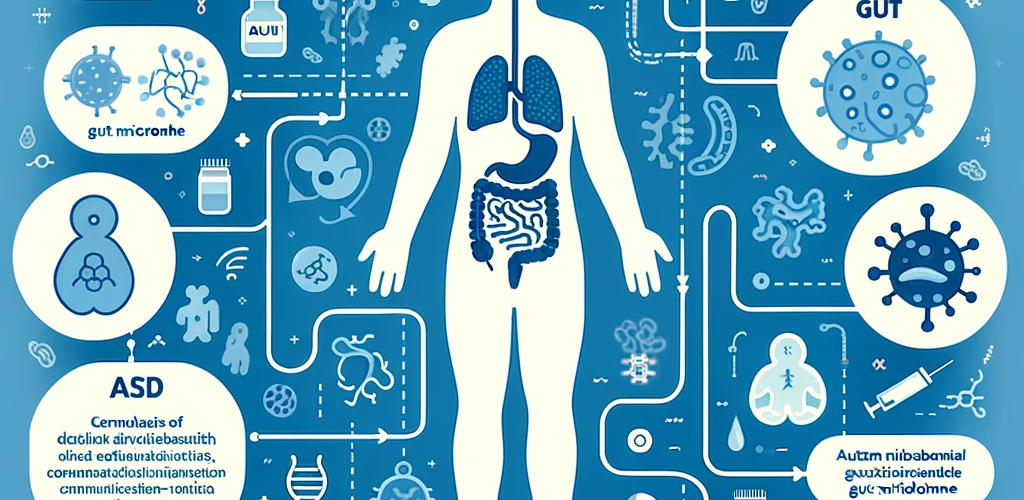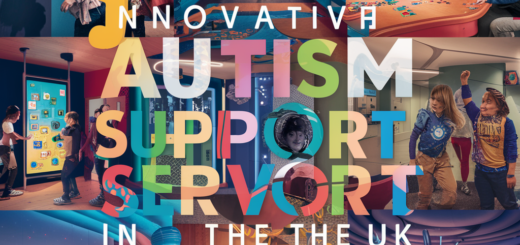Autism and the Gut Microbiome: Exploring the Gut-Brain Connection

The Gut-Brain Connection: New Insights into Autism and the Microbiome
Introduction:
Autism spectrum disorder (ASD) is a complex developmental condition that impacts how people communicate, interact, and behave. An estimated 1 in 44 children in the United States are diagnosed with ASD, making it more common than childhood cancer, diabetes, and AIDS combined.
While the causes of autism are still not fully understood, scientists have long suspected that the gut microbiome – the trillions of microorganisms that live in our intestines – plays an important role. New research sheds light on the connections between autistic symptoms, brain function, and gut bacteria.
The Gut-Brain Axis
The human gut hosts over 100 trillion microbes, including bacteria, viruses, fungi, and other microorganisms. This diverse community, called the gut microbiota, plays many essential roles in health, from aiding digestion and supporting immunity to producing essential nutrients and neurotransmitters.
Constant communication occurs along the gut-brain axis, a bidirectional pathway between the gastrointestinal and central nervous systems. Signals travel back and forth along neural networks, circulating hormones, and immune cells. An imbalance in gut microbes is known to impair gut-brain interactions and contribute to disease in multiple ways.
Inflammation and Leaky Gut
One way imbalanced microbes may contribute to autism is inflammation and a “leaky gut.” Some children with ASD seem to have more intestinal permeability, which allows bacteria and bacterial toxins to enter the bloodstream.
This triggers widespread inflammation and may impair the blood-brain barrier, the semi-permeable border that decides which substances enter the brain. A leaky gut also activates the immune system, skewing communication pathways between the gut microbiota and the central nervous system.
An altered gut microbiome and the resulting intestinal inflammation could impact brain development and function from an early age, leading to behavior changes characteristic of ASD.
Current diagnostic methods for gut dysbiosis, inflammation, and microbial neurochemical production
Diagnostic methods for gut dysbiosis, inflammation, and microbial neurochemical production are still being refined. However, there are several approaches that researchers are exploring to assess these factors:
- Microbiota Analysis: One standard method to assess gut dysbiosis is by analyzing the gut microbiota composition. This involves collecting stool samples and sequencing the genetic material to identify the different types of bacteria present. Researchers can locate specific microbial imbalances associated with the condition by comparing the microbial composition of individuals with and without gut dysbiosis.
- Inflammatory Markers: Assessing inflammation markers can provide insights into the presence and severity of gut inflammation. Blood tests can measure markers such as C-reactive protein (CRP) and fecal calprotectin to gauge the level of inflammation in the gut. Elevated levels of these markers may indicate the presence of inflammation and provide valuable information for diagnosis.
- Neurochemical Analysis: Analyzing neurochemicals produced by the gut microbiota is another promising avenue for diagnosis. However, this field is still relatively new, and methods for directly measuring microbial neurochemical production are currently being developed. One potential approach is analyzing metabolites in the blood or cerebrospinal fluid, which can provide insights into the neurochemical activity in the gut-brain axis.
- Metabolomic Profiling: Metabolomic profiling involves analyzing a comprehensive range of metabolites produced by the gut microbiota. This approach aims to identify specific metabolite patterns associated with gut dysbiosis and inflammation. By measuring and comparing metabolite profiles in individuals with and without these conditions, researchers may be able to identify diagnostic markers.
It’s important to note that while these methods show promise, more research is needed to validate their accuracy and establish standardized diagnostic procedures. As our understanding of the gut microbiota and its role in various conditions continues to evolve, we expect advancements in diagnostic techniques for gut dysbiosis, inflammation, and microbial neurochemical production.
The Gut-Microbiota-Brain Connection in Autism
Specific types of gut bacteria and their metabolic products seem to play an especially important role in the gut-microbiota-brain connection in autism spectrum disorders.
Multiple studies have found less diversity of gut microbes in children with autism compared to neurotypical kids. Specific bacterial groups, including Bifidobacterium and Prevotella species, also seem to be altered. The gut microbiome differs in autistic children with gastrointestinal symptoms compared to those without GI issues.
Notably, multiple intervention studies have shown promise in improving gut microbial balance and reducing autism symptoms:
-In an Israeli study, oral probiotics with Bifidobacterium species led to positive GI and behavioral changes in ASD children compared to placebo. Autism assessment scores improved significantly over the probiotics treatment period.
-Another study found that fecal microbiota transplantation (donating healthy gut microbes) in 18 ASD children resolved GI issues in most participants. Autism symptoms also improved notably over the next two years.
-Additional research shows that a ketogenic diet high in fat and low in carbs seems to boost healthy gut microbes like Akkermansia muciniphila and improve behavioral symptoms in autistic children.
Microbial metabolites—like short-chain fatty acids, neurotransmitters, amino acids, and peptides—are likely key mediators between gut microbes and the central nervous system. We are just beginning to understand these complex pathways.
Ongoing and Future Research Priorities
While it seems clear that a gut microbial imbalance contributes to autism spectrum disorder in some cases, much more research is needed to clarify the mechanisms, develop diagnostic tests, and discover effective treatments that target the gut-brain axis.
Critical priorities for ongoing research highlighted by experts in the field include:
The following are some important areas of autism research that focus on the role of gut bacteria and the brain:
- Understanding individual differences in how the gut microbiota and brain interact in ASD subpopulations. Personalizing treatments to suit each person’s unique microbial and genetic makeup shows promise.
- Investigating how prebiotics, probiotics, synbiotics, and postbiotics could help prevent autism or reduce symptoms. These may support healthy gut-brain development rather than trying to correct an established imbalance later on.
- Designing medications that modulate microbial metabolites, neurotransmitters, and inflammatory molecules critical for brain health during key developmental windows.
- Developing non-invasive blood or fecal tests that gauge gut dysbiosis, inflammation, and microbial neurochemical production to guide treatment decisions and monitor outcomes.
Given the soaring prevalence of ASD, cracking the gut-microbiota-brain code could bring hope to millions of families struggling with this mystifying condition. While much progress has been made in recent years, interdisciplinary collaboration spanning microbiology, gastroenterology, neurology, and mental health care promises to accelerate solutions even faster.
Discover more from Living with Autism
Subscribe to get the latest posts sent to your email.

